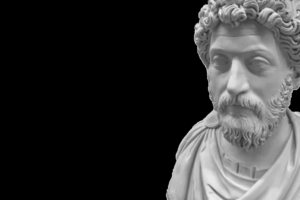The topic of retaliation, or lack thereof, is a hard one for some folks to grasp. On our Facebook Group, there has been a fair amount of discussion concerning a meme I posted on the subject. (I’ll include it below.) I’d like to expand on this topic to further clarify the stoic response to retaliation and anger.

The meme posted on the becoming stoic Facebook Group that has caused several negative comments.
What angers you enough to want to lash out and retaliate against someone? Did it cause us physical harm? Or was it a verbal insult or other such demeaning provocation? Did someone cut you off in traffic? Whip into the open parking space you were about to get? Did your spouse, after a hard day at work, speak harshly to you? There is a scale on which the term “wronged” can be placed. Likewise, there is a scale of acceptable actions. Hint: retaliation and anger aren’t included.
The stoic answer to this is to view the issue or event as a lesson. It sounds odd, doesn’t it? It is a lesson in who not to be. The best revenge is to not be like the person who performed the act. Don’t allow your emotions to rule your actions. We’ve all been in a situation when we’ve felt wronged or hurt and found our temper starting to rise. Furthermore, a stoic always focuses on keeping that anger under control. An anger response often leads to a downward spiral of cascading negative reactions. The best revenge is no revenge! So, let that go and move on with your life. Stoics just don’t operate in those terms. Retaliation is unbecoming and pointless.
Does this imply that if physically attacked and in danger you should not defend yourself? Obviously not. If given the choice, a Stoic would always choose peace over conflict. So, does someone saying something harsh to you justify you punching them in the face? No, it doesn’t. There is a scale of acceptable actions that all situations should follow, but one thing that most serious self-defense experts will teach is that you should always try to defuse any violent situation. ALWAYS!
Why is this a common theme with self-defense and martial arts instructors? Because when we let our emotional response of anger rule and we become involved in a violent encounter, there can be, and often are, serious consequences. In today’s world, you can be jailed, fined, sued, or, in the worst case scenario, killed in the action. So, is any of that worth your hurt feelings or bruised ego? No, it isn’t. De-escalation is always the go-to response in the majority of physical confrontations, but realistically, there are times when it can’t be applied. Albeit, there might be a time when you are in an extreme, life-threatening confrontation in which verbally defusing it is not an option.
Many of the ancient Stoics we read about and study were trained in various martial arts of the time. Why would they feel the need to hone such skills when they are men in command of their thoughts and actions? They understood that there are times and situations that can dictate a brutal and aggressive response on their part. In other words, they trained and knew how to fight, even if it was a last resort for them.
This reminds me of the words of Dr. Jordan B. Peterson: “A harmless man is not a good man. A good man is a very, very dangerous man who has that under voluntary control.” Many stoics fall under this description, and it is something to strive for if you aren’t there yet. Become well-trained and dangerous, has that kind of power under control, but always places peace above violence.









Most Commented Posts